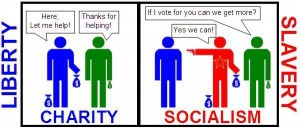
Why we should not use taxation to provide charity to the needy: A few arguments to consider
Tax funded “charity” is impossible by definition – True charity can only be done voluntarily. Assistance to the needy which is funded by taxation taken by force of law can not be considered charity since not everyone will have provided proper, voluntary consent. With an approximate 50% voting rate, and an almost equal split on both sides of the vote, we theoretically have 26% of the population forcing an illegitmate mandate on the 74% as to the method and amount of assistance they will provide to those less fortunate.
Put even more simply, if someone wishes to voluntarily donate money to causes serving the less fortunate, there are an abundance of private organizations/options available to them – – including voluntarily adding more to their tax bill/payment each year. The fact that the funding is taken forcibly via government taxation clearly illustrates the lack of voluntary consent.
It is immoral – virtue and morality can not be achieved through the coercive threat of violence. Coercive force is ultimately the source and support with all government taxation. As an analogy, take the scenario of the benevolent thief, rich man, and poor man. The thief points a gun at the rich man and takes a small portion of his wealth. He then gives that wealth to the poor man, telling him the source and method for how it was obtained. Which of these 3 individuals can claim the moral/virtuous high ground? The benevolent thief can not as he has used threats of violence to steal property which did not belong to him. The rich man can not claim to be charitable because his supposed altruism only came after threats to his person and at the point of a gun. The poor man knowingly received stolen property. The thief and poor man are less moral after this action, with the rich man being neutral. As Walter William’s expanded so clearly
Suppose I saw an elderly woman painfully huddled on a heating grate in the dead of winter. She’s hungry and in need of shelter and medical attention. To help the woman, I walk up to you using intimidation and threats and demand that you give me $200. Having taken your money, I then purchase food, shelter and medical assistance for the woman. Would I be guilty of a crime? A moral person would answer in the affirmative. I’ve committed theft by taking the property of one person to give to another.
Most Americans would agree that it would be theft regardless of what I did with the money. Now comes the hard part. Would it still be theft if I were able to get three people to agree that I should take your money? What if I got 100 people to agree – 100,000 or 200 million people? What if instead of personally taking your money to assist the woman, I got together with other Americans and asked Congress to use Internal Revenue Service agents to take your money? In other words, does an act that’s clearly immoral and illegal when done privately become moral when it is done legally and collectively? Put another way, does legality establish morality? Before you answer, keep in mind that slavery was legal; apartheid was legal; the Nazi’s Nuremberg Laws were legal; and the Stalinist and Maoist purges were legal. Legality alone cannot be the guide for moral people. The moral question is whether it’s right to take what belongs to one person to give to another to whom it does not belong.
Don’t get me wrong. I personally believe that assisting one’s fellow man in need by reaching into one’s own pockets is praiseworthy and laudable. Doing the same by reaching into another’s pockets is despicable, dishonest and worthy of condemnation. Some people call governmental handouts charity, but charity and legalized theft are entirely two different things.
This video also does a good job highlighting the moral argument and how the government agents act on our behalf – – if you wouldn’t directly threaten violence on the less charitable , why is it acceptable to vote and have others perform the threats/violence on your behalf?
It violates our rights – everyone is born with their natural rights to life, liberty and property. Or more precisely, everyone has a property right in themselves. This ownership covers both our bodies and that which we have mixed our labor (referencing John Locke). To take the work product of someone without consent is to violate their very person and is arguably akin to slavery. Consider a scenario of two individuals trapped on an desert island; Jones and Smith. Jones spends all day gathering drinking water, coconuts and catching fish so he can feed himself. The water, coconuts and fish are justly Jones’ property. Smith does nothing but lay around, but later steals all the water, coconuts and fish which Jones has produced. Is Smith’s violation of Jones’ property rights acceptable if he only steals a portion of the water, coconut and fish?
Maybe Jones is a miser and has plenty to spare, or maybe that is the supply he requires to survive – – either way, it is his property and within his rights to control that property and its disposition. People of good faith can argue whether we have a moral obligation to provide charity to those in need; but a ‘legal obligation’ backed by coercive force to redistribute justly acquired property is always a violation of our natural rights.

It is unfair – Taking from those who have produced and earned their success, and giving to those which did not earn is inherently unfair – – a concept even small kids can understand. Another good thought experiment is displayed in this video which shows college student’s horror as they are asked to give up grade points to help those fellow students who didn’t have as high of GPA
It is unconstitutional – The powers of the Federal Government are few and enumerated. Nowhere does it allow for redistribution of wealth on grounds of equality, benevolence, or any other reason. Don’t just take my word for it; consider the words of Madison who is regularly regarded as the father of the Constitution
- “I cannot undertake to lay my finger on that article of the Constitution which granted a right to Congress of expending, on objects of benevolence, the money of their constituents.”
- Annals of Congress, House of Representatives, 3rd Congress, 1st Session, page 170 (1794–01-10) [5]. The Annals summarize speeches in the third person, with the actual text of Madison’s quote as follows: “Mr. Madison wished to relieve the sufferers, but was afraid of establishing a dangerous precedent, which might hereafter be perverted to the countenance of purposes very different from those of charity. He acknowledged, for his own part, that he could not undertake to lay his finger on that article in the Federal Constitution which granted a right of Congress of expending, on objects of benevolence, the money of their constituents.” The expense in question was for French refugees from the Haitian Revolution.
It increases the overall level of poverty – providing a basic safety net often sounds appealing and compassionate, but there is always the proverbial risk that the safety net becomes a hammock, and even a web/trap which ensnares the poor into a life of dependency and poverty. The evidence and basic economic law show us that anytime you subsidize something, you get more of it. In this case, we are subsidizing poverty and non-productivity and the reaping the effect of increased levels of both. On the flip side, anytime we are punishing success, even to small degrees, will have a negative impact on the incentive structure and desire to excel economically. Free trade, property rights, and the pursuit of profit have been the key reasons billions of people have been lifted out of poverty in the last 200 years.
It reduces the happiness of the recipients – the abundance of evidence on the subject of happiness conclusively points to the fact that people are much happier when they feel like they are in control of their own lives, and have economic freedom and earned success. The less fortunate become less happy as they become more dependent, and as they understand they did not fairly earn the resources given to them.
It is unnecessary – prior to the big government welfare programs, the truly needy were helped by true charity from friends, family, churches, neighbors, fraternal associations…etc. Again, the research clearly shows that as the government intervention increases, all of these institutions and sources of charities decrease.
- Frank Chodorov was giving a talk many decades ago. Chodorov was being very critical of government welfare programs in general, and was asked by a listener: “But what will happen to sick, elderly people?” Chodorov replied: “They’ll be left to die in the streets the way they used to.” The listener retorted: “When did that ever take place?,” to which Chodorov answered: “Exactly.”
Here is another good, quick video touching on the subject of winning the argument by focusing on the morality as well as the utilitarian/results
Tax funded “charity” is theft! It is also unnecessary and counterproductive.
